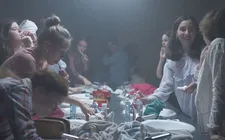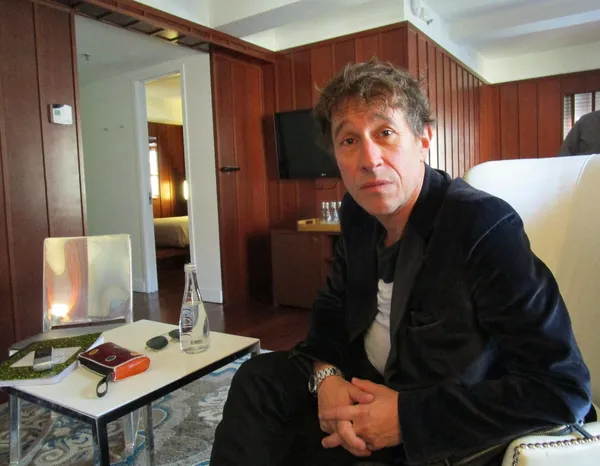 |
| Zombi Child director Bertrand Bonello on Olivier Meyrou's Yves Saint Laurent and Pierre Bergé documentary Celebration: "It's beautiful. A beautiful film." Photo: Anne-Katrin Titze |
The last time I spoke with Bertrand Bonello, it was on Nocturama at the Rendez-Vous with French Cinema luncheon in 2017, hosted by uniFrance at Robert De Niro's Locanda Verde in Tribeca. The event was also attended by Django director Étienne Comar and Reda Kateb (who portrays Django Reinhardt), Film at Lincoln Center's Director of Programming Dennis Lim, along with numerous members of the French film delegation.
This time around, Bertrand and I met at the Hudson Hotel the morning before the New York Film Festival US Premiere at Alice Tully Hall of his latest film, Zombi Child, with Mackenson Bijou, Louise Labèque, Wislanda Louimat, Katiana Wilfort, Adelé David, Ninon François, Mathilde Riu, and Patrick Boucheron. This is not Jim Jarmusch's The Dead Don't Die.
We begin in Haiti 1962 in Zombi Child - clouds move across a ghostly moon. We see and hear a blowfish cut open. A potion is being poured into the penny loafers of a man unawares. Bonello reaches into rituals. A coffin is danced to the grave. Zombi workers conjure up images of slavery. Cut to a classroom in France of the present.
At a boarding school for girls, founded by Napoleon in 1804 for the descendants of members of the Légion d'honneur, the granddaughter of the man with the penny loafers who became a Zombi, makes new friends. One of them obsessively texts her boyfriend. Two worlds shaped by distinct histories collide. An aunt gives news to the dead. She might help out in cases of troubled love life, or she might not.
Anne-Katrin Titze: I am going to meet with Olivier Meyrou, the director of Celebration, the Yves Saint Laurent documentary, which just opened now here and which you saw years ago. Weren't you able to use some of it for your Saint Laurent film?
Bertrand Bonello: Yes, I saw the film while I was writing. But I know it has been very difficult for him because the film has been a problem with Mr. Bergé.
AKT: Not anymore now. Now it's out there.
BB: Not anymore.
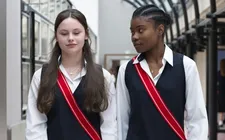 |
| Louise Labèque as Fanny with Wislanda Louimat as Mélissa in Zombi Child |
AKT: I loved the film.
BB: It's beautiful. A beautiful film.
AKT: I'll give him your greetings.
BB: Yes, please.
AKT: In Zombi Child, I noticed in the end credits a mention of a song called Papa Legba. Legba is a fascinating mythological figure.
BB: Yes. It's a spirit, yes. Who opens the door.
AKT: He is the deity of the in-between. The inside and the outside. The gatekeeper.
BB: He allows the bridge between life and death in a way.
AKT: And of everything in-between. I thought, do you feel a bit like Legba with this film?
BB: I'd love to! I don't know. Maybe. I'd say yes.
AKT: It's the idea of two sides that you like. You did it in Nocturama where you present us with two things. I thought Legba is your deity.
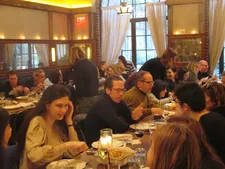 |
| Rendez-Vous with French Cinema luncheon in 2017 at Robert De Niro's Locanda Verde Photo: Anne-Katrin Titze |
BB: Okay, I accept the likeness.
AKT: Very early on in Zombi Child, you show the cutting of a blowfish. I noticed more than anything the sound. More than the visuals, it opens up the film.
BB: It's natural sound, we didn't add anything. It gives something very organic to the scene.
AKT: In a film that includes so much fantasy, there is an equal amount of realness?
BB: Yeah, I think it's a kind of hybrid film, you know. You have something very fictional, something that is almost a genre movie. Like a teen movie is a genre movie or horror film is a genre movie. But you have something very ethnological also, and even documentary, as in the history lesson. It's a film that goes through many different - not styles, but - I'd call it hybrid film.
AKT: History is very important. The film is about how much we are grounded in our history, how much we are haunted by history.
BB: Yes. It's what do you do with your history? It can be in an intimate way, like for example that young Haitian girl. What does she do with her history? She's the granddaughter of a Zombi. Does she deal with that? But also from the Haitian people. What do they do with their history, which is very very strong?
But I think they know what they do. But what do French, for example, do with our history? It's more complex, you know. As the teacher says: Okay, we invented revolution and have this very big notion of freedom in France. It's known all over the world. But have we been good with that? Or not? How do you live with your history? It's one of the main subjects of the film.
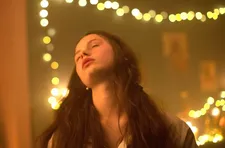 |
| Bertrand Bonello on the very big notion of freedom in France: “How do you live with your history? It's one of the main subjects of the film.” |
AKT: And the boarding school is a real school, founded by Napoleon in 1804?
BB: Yes, 1804. For this school, I didn't invent anything. Everything is real. The uniforms, the habits, the way they do things - it's exactly how it is.
AKT: It feels very real. I went to an only girls school, and some of the scenes - the brushing teeth, the washroom scenes, the interactions felt super real and not like a movie director fantasy of a girls boarding school.
BB: Thank you.
AKT: On the other hand, there's a scene where the aunt says "I give news to the dead." She has a shrine which resembles Truffaut's The Green Room.
BB: Yeah, a little. But in fact, us Occidentals, we have a real strong cut between life and death and living people and dead people. In these kinds of cultures, like some in Africa or South America or Voodoo, there are some real bridges between the dead and the living. They don't make this cut that we do since the Greeks. So it's what she tries to explain to this young girl, "We have bridges."
Zombi Child screened at the London Film Festival on October 9 and will screen again on October 11 at 3:30pm.
The 2019 New York Film Festival runs through October 13.








